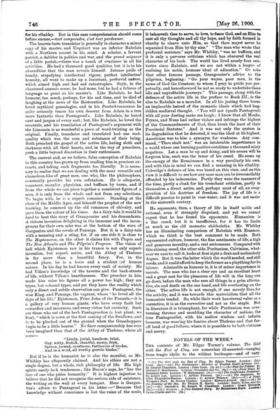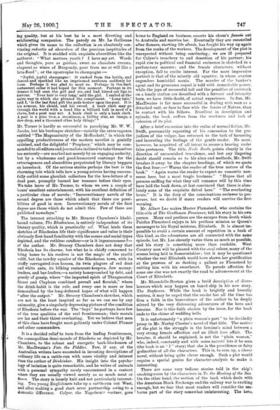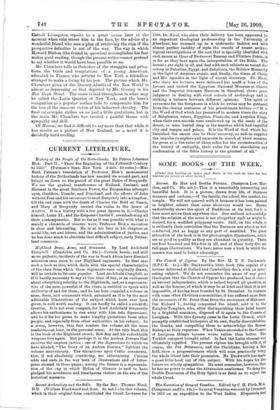NOVELS OF THE WEEK.*
THE contents of Mr. Edgar Turner's volume, The Girl with the .Feet of Clay, are somewhat ill-assorted—ranging from tragic idylls to the wildest burlesque—and of vary-
* (1.) The Girl with the Feet of Clay. By Edgar Turner. London : John Long. (68.)—(2.) The Rhodesians: Sketches of English South-dfrioan Ltfc. By Btracey Chambers. London : John Lane. [3s. 6d.]—(S.) Fate the Fiddler. By Herbert C. Macilwaine. London : Constable and Co. [es.]—(4.) Nude Souls. BY Benjamin Swift. London : W. Heinemann. (6s.)—(5.) The Gentleman Pensioner. By Albert Lee. London : C. Arthur Pearson. [68.]—(13.) The Seafarers. BY John Bloundelle-Burton. London : C. Arthur Pearson. [138.1—(7.) d Plain Woman's Part. By Norley Chester. London : Edward Arnold. [M.] —(8.) To the Healing of the Sea. By Francis H. Hardy. London: Smith, Elder, and Co. (6s.) —(9.) Outsiders. By Robert W. Chambers. London : Grant Richards. [6s.]—(10.) Haromi: a New Zealand Story. By Bannerman Hays. London I James Clarke and Co. [a.]
lag quality, but at his best he is a most diverting and exhilarating companion. The parody on Mr. Le Gallienne which gives its name to the collection is an absolutely con-
vincing reduetio ad absurdum of the precious ineptitudes of the original. It is studded with exquisite absurdities like the
outburst: "What matters youth ? I have my art. Words and thoughts, pure as geishas, sweet as chocolate creams, eloquent as wines of Burgundy, pour from me at will like a lava-flood"; or the apostrophe to champagne :— "Joyful, joyful champagne ! It rushed from the bottle, and danced and sparkled like an imprisoned sunbeam suddenly let loose. Perhaps it was glad to meet us. Perhaps in the dark restaurant cellar it had hoped for this moment. Perhaps in its dreams it had seen the girl and me, and had kissed our lips to fervour. Your hair is very long,' said the girl. I smiled at the nave way in which she phrased the compliment. Long hair,' said I, is the last fond gift the gods bestow upon the poet. It is his armour, his shield, and his sword. A bank clerk may go through the world with a head like a billiard ball in need of a shave, but a poet may not. A bank clerk is only a bank clerk. A poet is a pine tree, a moonbeam, a falling star, an image, a dew-drop, and a thousand other holy things.' " Mr. Turner is hardly so successful in parodying Mr. W. W. Jacobs, but his burlesque sketches—notably the extravaganza entitled "The Magnanimity of the McRockett," in which the appalling productiveness of the modern novelist is genially satirised, and the delightful "Prophecy," which may be com- mended to all editors and journalists inclined to take themselves too seriously—are marked not merely by an engaging audacity, but by a wholesome and good-humoured contempt for the extravagances and absurdities perpetrated by literary beggars on horseback. Of the serious stories perhaps the best is the charming tale which tells how a young actress having success- fully outbid some ghoulish collectors for the love-letters of a dead poet, promptly burned her treasure before their eyes. We take leave of Mr. Turner, to whom we owe a couple of hours' excellent entertainment, with his excellent definition of a particular class of novels: "Insurrectionary novels of the second degree are those which admit that there are possi- bilities of good in men. Insurrectionary novels of the first degree are those which do not admit this. Few of these are published nowadays."
The interest attaching to Mr. Stracey Chambers's khaki- bound volume, The Rhodesians, is entirely independent of its literary quality, which is practically nil. What lends these sketches of Rhodesian life their significance and value is their obviously first-hand familiarity with the scenes and social types depicted, and the ruthless candour—or is it ingenuousness F— of the author. Mr. Stracey Chambers does not deny that Rhodesia has its charms, but what he is chiefly concerned to bring home to his readers is not the magic of the starlit veldt., but the tawdry squalor of the Rhodesian town, with its stuffy corrugated-iron houses, its twin plagues of red dust and white ants, its bilking restaurant-keepers, Jew money- lenders, and bar-loafers,—a society honeycombed by debt, and greedy of gossip, where "the imported spirit of Throgmorton Street and Clapham combined prevail and flourish," where
the drink-habit is the rule, and every one is more or less demoralised by the long-deferred hopes of what will happen "after the output." Mr. Stracey Chaznbers's sketches, which are not in the least inspired so far as we can see by any animosity, give a singularly depressing picture of the condition of Rhodesia before the war. The "boys" he portrays have few of the true qualities of the real frontiersman; their morals are lax and their thirst everlasting. Yet we believe that men of this class have fought most gallantly under Colonel Plumer and other commanders.
It is a decided relief to turn from the loafing frontiersmen, the cosmopolitan demi-monde of Rhodesia as depicted by Mr.
Chambers, to the robust and energetic back-blocksmen of Mr. MacRwaine's Fate the Fiddler. Few, if any, of the Australian writers have succeeded in investing descriptions of ordinary life on a cattle-run with more vitality and interest than the author of Dinkinbar. His insight into the psycho- logy of isolation is quite remarkable, and he writes of animals with a personal, sympathy rarely encountered in a context where they are usually viewed merely as so much meat or fleece. The story is loosely knit and not particularly interest- ing. Two young Englishmen take up a cattle-run out West,
and after making a good start sever partnership owing to a domestic difference. Colyer, the Napoleonie nartner, goes home to England on business, escorts his chum's fianafe out to Australia and marries her. Eventually they are reconciled after Somers, starting life afresh, has fought his way up again from the ranks of the workers. The development of the plot is unexpected without being convincing ; we are ill prepared for Colyer's treachery to and desertion of his partner; his rapid rise to political and financial eminence is sketched in a perfunctory manner; and the female characters, without exception, fail to excite interest. Far the most impressive portrait is that of the miserly old squatter, in whom avarice engenders homicidal mania. The murder of the banker's agent and its gruesome sequel is told with remarkable power. while the joys of successful toil and the penalties of overwork on a lonely station are described with a fervour and intensity born, we have little doubt, of actual experience. In fine, Mr. MacIlwaine is far more successful in dealing with man as a detached unit, or face to faze with the forces of Nature, than in contact with his fellows. Excellent in description and episode, the book suffers from the weakness and lack of cohesion of its plot.
After a brief excursion into the realm of normal fiction, Mr. Swift, presumably repenting of his concession to the pre- judices of the vulgar, has returned to the task of harassing and lacerating the feelings of the gentle reader. He must, however, be acquitted of all intent to secure a hearing under false pretences. The title, Nude Souls, points clearly in the direction of unvarnished truculence, and lest any lingering doubt should remain as to his aims and methods, Mr. Swift brushes it away by the chapter headings, of which we quote the first four :—" Warns the reader of the true nature of the book." "Again warns the reader to expect no romantic non- sense here, but a most tragic business." "Hopes that all persons sniffing for what they call romance will by this time have laid the book down, at last convinced that there is abso- lutely none of the exquisite drivel here." "The everlasting brute." It is the duty of the conscientious reviewer to per- severe, but we doubt if many readers will survive the first warning.
Mr. Albert Lee makes Master Flamsteed, who sustains the title-r3le of The Gentleman Pensioner, tell his story in his own person. Many and perilous are the escapes from death which Fairfax Flamsteed enjoys in his perilous mission as Queen's messenger to his Royal mistress, Elizabeth. It is almost im- possible to avoid a certain amount of repetition in a book of this kind, as the adventures are all connected with the same episode, but Mr. Lee cleverly varies them as much as possible, and his story is something more than readable. West Country men will be pleased with the Local colour, many of the scenes being laid in Somersetshire ; but it may be questioned whether the real Elizabeth would have shown her gratification at the prowess of so dashing a gallant as Flamsteed by uniting him with his sweetheart. To parade affection for some one else was not exactly the road to advancement at the Court of Elizabeth.
Mr. Bloundelle-Burton gives a lurid description of divers horrors which may happen on board ship in his new story. The Seafarers. While the book is brightly and breezily written, it may be urged that the reader has all the time too firm a faith in the benevolence of the author to be deeply stirred by the very distressing adventures of the hero and heroine. Nor is this faith shaken by the issue, for the book ends to the chime of wedding bells.
It is unfortunately "a plain woman's part" to be decidedly prosy in Mr. Norley Chester's novel of that title. The motive of the plot is the struggle in the heroine's mind between u very strong female affection and an illicit love affair. The heroine, it should be explained, is not the "plain woman," who, indeed, constantly and with some naIvet4 lets it be seen (the book is an " I " story) that she is the providence or fairy godmother of all the characters. This is, to sum up, a clever novel, without being quite clever enough. Such a plot would require a special genius for character-analysis to make it interesting.
There are some very tedious stories told in the ship's smoking-room by the characters in To the Healing of the Sea. On the other hand, the section of the book which deals with the American Stock Exchange and the railway war is exciting enough, but we fear that most readers will consider the sea- borne part of the story somewhat uninteresting. The he'ro, Perron' Livingston, repairs to, a great ocean liner at the moment when ruin stares him in the face, by the advice of a wonderful friend who sees a plan of retrieving the ruin if the prospeCtive defaulter is out of the way. The way in which Howard Blabon (the friend in question) accomplishes his feat makes good reading, though the present writer cannot pretend to say whether it would have been possible or no.
Mr. Chambers tells in Outsiders of the struggles and priva- tions, the trials and temptations, of a young American, educated in France, who returns to New York a friendless stranger to make a living by his pen. The picture which Mr. Chambers gives of the literary Alsatia of the New World is almost as depressing as that depicted by Mr. Gissing in his New Grub Street. The scene is laid throughout in what may be • called the Latin Quarter of New York, and the hero's recognition as a popular author fails to compensate him for the loss of the innocent victim of his indiscreet chivalry. The final catastrophe strikes us as just a little gratuitous, but in the main Mr. Chambers has treated a painful theme with sympathy and skill.
Of Haromi we find it difficult to say more than that while it has merits as a picture of New Zealand, as a novel it is decidedly hard reading.








































 Previous page
Previous page